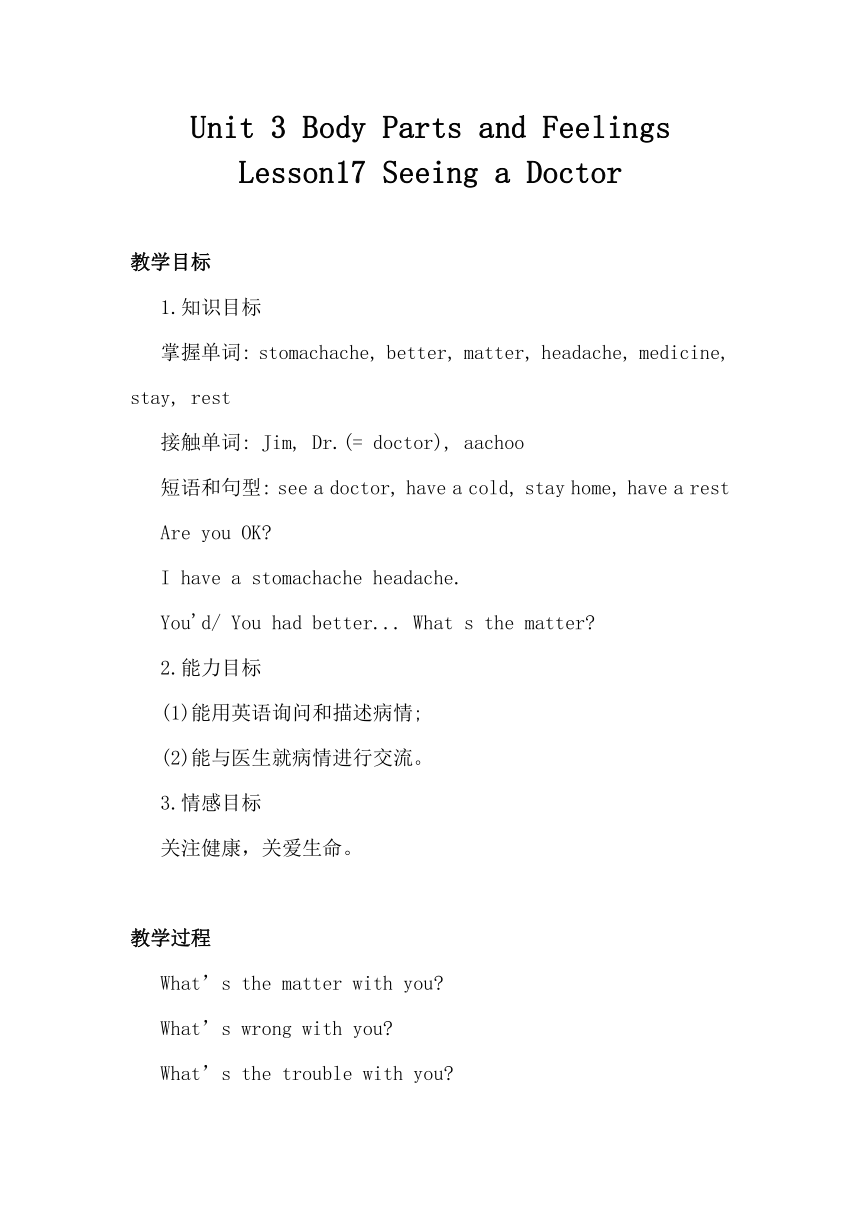
Unit 3 Body Parts and Feelings Lesson17 Seeing a Doctor 教学目标 1.知识目标 掌握单词: stomachache, better, matter, headache, medicine, stay, rest 接触单词: Jim, Dr.(= doctor), aachoo 短语和句型: see a doctor, have a cold, stay home, have a rest Are you OK I have a stomachache headache. You'd/ You had better... What s the matter 2.能力目标 (1)能用英语询问和描述病情; (2)能与医生就病情进行交流。 3.情感目标 关注健康,关爱生命。 教学过程 What’s the matter with you What’s wrong with you What’s the trouble with you What’s wrong with you My leg hurts. Practice: What’s the matter with… --He/ She has a… He has a toothache She has a stomachache. He has a backache. She has a cold. He has a fever. He has a headache. What’s the matter with them She has a cough. They have the flu. He has a running nose. She has a sore throat. What’s the matter (with sb.) =What’s wrong (with sb.) =What’s the trouble (with sb.) 回答: He/She has a .... I have.... have a stomachache/ headache/toothache/backache have a fever/cold/cough stomachache/ st m ke k/ better / bet / matter / m t / headache / hede k/ medicine / medsn/ stay /ste / rest /rest/ n. 肚子痛;胃痛 adj.&adv. 更好的(地) n. 问题 n. 头痛 n. 药 v. 停留留下;待一段时间 n.&v. 休息 1. I have too much ice cream and I have a s_____. 2. You need to take some _____ (medicine) and have a good rest. 3. --What’s the _____(问题) with your father 4. I have a headache. I want to _____(呆在家里) and _____(好好休息). Listen and write true(T) or false(F). 1. Jim’s leg hurts. ( ) 2. Wang Mei has a headache. ( ) 3. Li Ming tells Wang Mei to go and see a doctor. ( ) tell sb (not)to do sth. 叮嘱某人做(不要做)某事 Jenny: _____, Jim Are you _____ Jim: See my arm It _____! Jenny: It _____ bad! Let’s _____ a doctor. Li Ming:_____,Wang Mei Wang Mei : Aaah,I feel _____. I have a _____. Li Ming: You'd better _____a doctor, Wang Mei. 主语+have/has + a +病症 身体部位+ hurt(s) 主语+have/has + a +身体部位-ache have a cold 感冒 have a headache 头痛 have a toothache 牙痛 have a backache 背痛 have a fever 发烧 have a sore throat 嗓子痛 have a sore back 背痛 You’d better go and see a doctor. 你最好去看医生。 “’d better” 是 had better 的缩写形式,用来给别人提建议,意为“最好……”,后跟不带“to”的动词不定式(动词原形); e.g. You’d better drink some water. 否定形式:had better not do sth. e.g. You’d better not eat too much sweets. You’d better +动词,意为“你(们)最好……”; Let’s +动词原形,意为“让我们……吧”; What/How about +动词-ing… 意为“……怎么样?”; You should +动词原形,意为“你(们)应该……”。 单项选择 1.I have _____ stomachache. I feel terrible. A.a B.an C.the D./ 2.I'm tired. I want to have a _____. A.class B.rest C.cold D.Swim 3.—How are you feeling now —Much _____ after the medicine. A.good B.well C.better D.bad 4.—Your trainers(跑鞋) _____ colourful. —Yes. And they are popular among young people. A.feel B.smell C.taste D.look ... ...
~~ 您好,已阅读到文档的结尾了 ~~